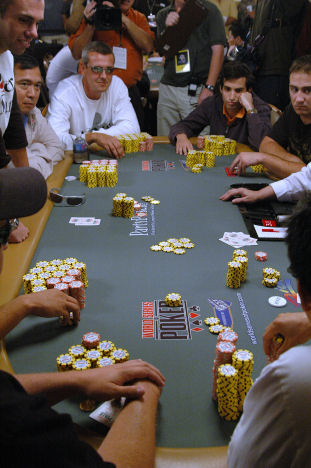 Author: Barry Randall, Crabtree Asset Management
Author: Barry Randall, Crabtree Asset Management
Covestor model: Crabtree Technology
It’s that time of year again: the World Series of Poker (WSOP) is underway in Las Vegas. The WSOP includes 61 separate events, culminating in the Main Event: the Texas No-Limit Hold ‘Em tournament that has drawn over 6,000 players this year hoping for a multi-million dollar payoff.
Some Main Event entrants are boldfaced names, including Doyle Brunson, Antonio Esfandiari, and a statistically improbable number of pros named “Phil”. Most Main Event entrants, however, are bucket-list amateurs, perhaps a few of whom have sold 16 shares of Apple to afford the $10,000 entry fee.
With so many people playing poker or watching it on television, it’s become fashionable among professional investors to compare poker with investing. First, there is the obvious physical similarity: participants in both activities are generally working indoors, sitting down, putting money at risk and looking to increase their net worth.
Helping to cement the connection between the two activities are high-profile poker players whose Wall Street day jobs pay a lot better than your average Vegas card tournament. In early July, Greenlight Capital’s founder David Einhorn finished third in a special WSOP charity tournament. In doing so, Einhorn bested 45 of the 48 world-class players who’d put up the $1 million entry fee. (A guy named Phil finished fourth.) Einhorn won over $3 million for his efforts. That’s probably a rounding error (or a bellhop tip) for the hedge fund wizard who shorted Lehman Brothers into the grave.
And Einhorn isn’t alone. One of the hottest poker players right now is a former BNP Paribas derivatives trader named Andy Frankenberger. Within the last year, Frankenberger has won a WSOP tournament, as well as a World Poker Tour event.
Plus, there’s no shortage of books and articles making the comparison between poker and investing. These usually emphasize concepts like risk management and expected payoff that are common to both.
But these similarities are pretty superficial, while the differences are substantial. And failing to understand the differences could deliver a bad beat to investors eager to double up. Here are four major differences:
1) Poker is parimutuel, while investing is not. In plain English, this means that a poker game (or tournament) is generally a closed economic loop. The pool of money from the buy-in will eventually be divided up among the participants, with perhaps only the top 10% of winners/survivors collecting any payout. Thus, the expected payoff for winning isn’t determined until the number of players is known.
Investing, on the other hand, takes place in an open economic loop, with money flowing in and out of capital markets in general and also flowing from one market (e.g., stocks) to another (e.g., bonds). Any expected returns are influenced not only by the performance of the company in which you’ve invested, but also by money flows in and out of markets and stocks.
Even if you correctly analyze and forecast a company’s earnings performance, the price of its stock might not reflect that performance, because supply and demand (the true determinants of price) could drive a stock price in an unforeseen direction. The number of investing “players” is neither known nor steady.
2) In poker, there’s no such thing as a dividend. In poker, the only way to make money is to take it from the other players. It’s a zero-sum game. With investing, however, you can make money not only by “taking” it from other players, but also by taking it from the companies in which you’ve invested.
Poker chips don’t pay dividends, but many stocks do. Sometimes, choosing to temporarily not invest is often a prudent strategy. You always have the option of moving to the sidelines (cash) or into income-producing instruments (dividend payers) if your investment discipline calls for it during times of market tumult or extended valuations.
In poker, you’re forced to participate through antes that constantly consume your stack. Fortunately, investors have other options.
3) Poker is all about individual psychology, but investing is about mass psychology. With all forms of poker, the mathematics (e.g. implied odds, pot odds, etc.) are straightforward. After that, success is about applied experience. Sizing up your opponent by looking for “tells” or recalling hands previously played is how an advantage is won or lost.
With investing, it’s pointless to speculate on the emotional states of the other market participants because a) there are too many to count, and b) most of them aren’t even human: they’re algorithms. Seventy percent of domestic trading volume is initiated by computer code, mostly through high-frequency trading programs. Some of this computer code no doubt tries to incorporate themes of mass psychology, such as price momentum, but as for the rest of it, who knows, other than the programmers themselves?
4) In poker, a large stack of chips is an advantage; in investing, a smaller stack is better.
If you’ve got more poker chips than your opponent, you can apply more pressure, even if you and your opponent(s) hold the same hands. This is especially true in no-limit games, where you can force your opponent to risk all his or her chips on one hand. If Mr. Big Stack loses, he’s still got chips to play.
But if Mr. Big Stack was a portfolio manager at Fidelity, managing eight gazillion dollars, then trying to invest in some mid-cap company in a size large enough to matter is going to take a lot of time and a very clever trader. A non-pro can easily slip into and out of that same stock without moving the market. It’s true: size matters, and when it comes to investing — smaller is better.
One of the most persistent tropes connecting poker and investing is that succeeding in either is supposed to require the ability to make decisions with imperfect information . That may be true, but what was the last decision you made with perfect information? From buying a house (what’s behind those walls?) to a major medical procedure (the surgeon’s blood alcohol content?), we make virtually every high-stakes decision with uncertainty. About the only things that are certain in life are death, taxes and that every poker tournament will have a player named Phil.
Photo by flipchip/LasVegasVegas.com




